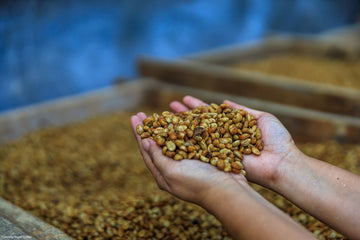Coffee Composting
Hey there, Green Thumb! Did you know you could get more out of your coffee than a super tasty cuppa joe? Does it feel wasteful to just throw those grounds in the trash after brewing your java when you worked so hard to roast it perfectly? Did you know chaff can do more for you than just be a nuisance you have to clean out of your roaster? Well strap in my friend, we're gonna tell you how to give all that stuff you used to throw in the trash a second life as tasty plant food!

Composting Coffee: The Basics
"What exactly is composting? I've heard of it, but I think that's just something farmers do to save money on fertilizer." Well we've got some learnin' to toss yer way then, city folk! Composting is simply reusing food, yard and paper waste by turning it into the foods plants crave. To say it scientifically, "compost is made by decomposing organic materials into simpler organic and inorganic compounds." (Wikipedia - "Compost"). This means everything from banana peels to eggshells and yard clippings can go into a compost pile! Well processed compost produces extremely fertile soil which can be used in place of or in conjuction with chemical fertilizers for planting anything from agricultural crops to garden beds and potted plants. The entire process of composting is complex and depends on what your end planting goal is for the soil so the ins and outs are out of the scope of this article (there's tons of articles online devoted to this, don't worry!) but the important thing to know is that used coffee grounds, coffee filters and chaff leftover from roasting can all go into your compost pile!
But...isn't coffee too acidic?
Yes and no! While brewed coffee (the liquid not the grounds) has a typical pH of around 5, which is considered mildly acidic, the grounds themselves are much closer to neutral. According to Oregon State University, coffee grounds have a typical acidity of 6.5 to 6.8. With 7 being a neutral pH, meaning not acidic or alkaline, coffee grounds come pretty darn close enough to not be a problem for your soil. Oregon State also goes on to say that coffee grounds are an excellent source of nitrogen and also help to improve soil structure. There's even evidence that it helps to repel slugs and snails!

What about the browns and the greens?
Veteran composters will warn that your compost should contain both brown material, such as paper which is carbon rich and green material such as grass clippings which are nitrogen rich. Coffee grounds are considered a green material but what about the other part of the equation? Good news! Your coffee filter and roaster chaff are brown material! All three can go straight in the pile, no muss, no fuss.
How much is too much?
Can you have too much coffee grounds in your compost? Researchers say yes, but I doubt you're going to have too much unless you're running a coffee shop out of your garage. It's important to have a good balance of materials and it's always important not too have too much of a good thing, even if that thing is coffee. The Master Gardener at Washington State University advises that the best results have come from using coffee grounds as 10-20% of your compost pile makeup. She even suggests that coffee can help make your plants more disease resistant!
The Bottom Line
So maybe you're not a master gardener and if your thumb is green, it's because you dipped it in pea soup. That's ok! Set aside a small corner of your yard and start tossing in your grass clippings, leaves, banana peels and eggshells as well as coffee grounds, filters and chaff. Before you know it, you've got super fertile soil to use with your potted plants! Or maybe your herb garden. You know, the one you've been talking about starting for years but can't seem to find the time to. I'll tell you this for sure, it's a lot easier to be motivated to finally start it when you've got a pile of amazing soil ready to go, all built out of food scrapes and coffee trash that you'll now get to enjoy a second time!
For more reading on general composting tips, you can start with an article on the basics of composting from the Environmental Protection Agency (EPA):
https://www.epa.gov/recycle/composting-home






